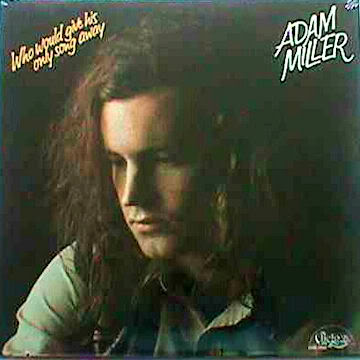
When Wes Farrell, the man who penned the perennial evergreen "Hang On Sloopy," and was overseer to the phenomenal chart successes of the Partridge Family and David Cassidy, set up his own record label in 1972, his maiden release wasn't a sure fire pop confection. He began proceedings with an exquisitely crafted collection of psych outsider introspection. Adam Miller, his new discovery and recipient of this gracious act of faith didn't set the world aflame, he didn't even darken it's edge, and today remains unknown, his album the victim of at best a misreading of the small print one is required to field when stumbling across an artist with no fame attached to the name above the title, more than four decades after the event. Chelsea Records became an outlet for pop and disco, especially the wonderfully camp and catchy Disco Tex and his Sexolettes, to name but one. It didn't suggest a testament of smouldering intensity and insight that would give the likes of Sixto Rodriguez, a man who knows a thing or four about waiting around in the doldrums of obscurity before recognition finally pays a much belated call. The albums enigmatic, cryptic name Who Would Give His Only Song Away is suitably intriguing and enigmatic, as is the young man looking downwards from the front cover. As of now there is precious more to add but the songs which are arranged with immense decorum and class by the respected jazz pianist Michael Melvin.
The proceeding begin with "Man Of My Word" which was also a single, which perfectly introduces the listener to an uptempo hook and alerts the ears to the arrival of a spirited talent of natural poise in the guise of an understated epic. This is neatly followed by "Hope I Win" a hauntingly sparse song of displacement: "I just arrived with the last load. They bought me here and dumped me on the road. 600 more have arrived this week." This suggestion of migration has solidified my hunch that Miller may be English, he certainly sounds like he is. The words are perfectly underscored by an almost gospel female vocal that drives home a subdued punch. "So Tired" begins with a piano motif that is reminiscent of early Billy Joel, a refreshingly aching pop ballad perfectly driven and discreetly hammered home by the ivories being low down in the mix, suggestive of the best of George Harrison's balladry cushioned by an orchestral, almost pastoral arrangement.
Electronic piano of the tastefully judged kind means "I Agreed" hovers somewhere between Jose Feliciano and Sergio Mendes, but with a deftly delivered rock riff, before rising to an orchestrated climax fading in and out of potential overkill, but never allowing its psych soul basis to become unbridled. In "Baby's Back Home" there is an uncanny white boy treatment along the urban fault-lines of Gil Scott Heron's "Home Is Where The Heartache Is," suggestive of almost blown neon flickering its last in a downpour from the night sky, with a touch of sax to embellish the picture. "Who" contains the line that provides the basis of the title, but is even more enigmatic by being "Who would give his only son away." It is a flute driven psych frenzy, all classical piano downturns in a controlled jam setting. An absolute gift of a song. A flute arrangement also encrusts "Faraway" which emerges as a melancholy lullaby that wouldn't be out of place on a Rodriguez album.
"Get Back On The Hill" continues the elements of psych breeziness, all tasteful percussion and a laconic vocal ease, it reaches a near perfect climax of pop and introspection. Credible commercial ambition is cleverly undersold with a powerful punch in "Sign On" whose neat alignment of piano and confident degree of effortlessness and catchiness, means this song resides in the mind long after it's hearing. The box of tricks is then finally closed by the sadly confessional "Run Like the Wind".
There is no denying the amount of labour and love that went into the crafting of such a deft album of songs that time and circumstance has chosen to ignore. Wes Farrell is now dead, as is Michael Melvoin, and as for Adam Miller, there was a second album and single, and a song covered by Helen Reddy, but by 1975 his trail dwindles into silence, and yet there is a valuable currency residing in the dusty grooves of his neglected efforts. He didn't give his only song away, but he did leave all of them behind, abandoned on vinyl and on tape. It is time he reclaimed his wonderful efforts, because others should, and will do so, for his gifts remain in evidence of his talent and his absence.
